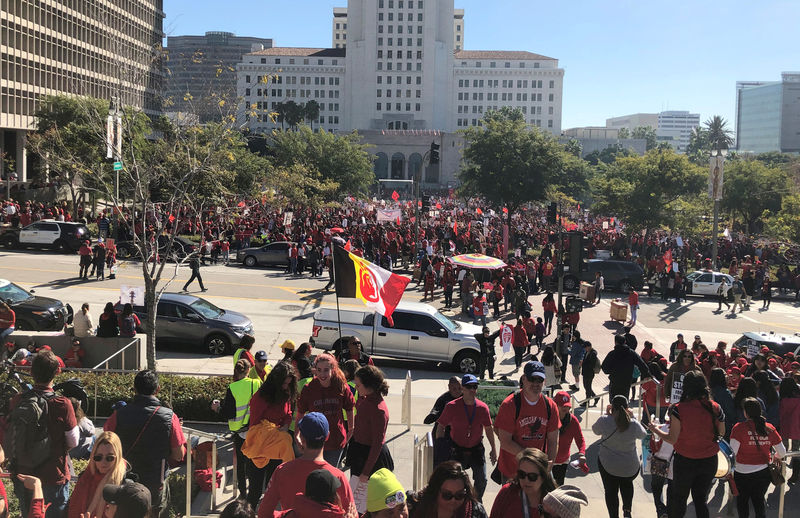By Steve Gorman
LOS ANGELES (Reuters) - After settling a strike that galvanized support for long-neglected public schools in America's second-largest school district, the Los Angeles teachers union is turning its sights on major new sources of sustained education funding.
The head of the United Teachers Los Angeles (UTLA) union, Alex Caputo-Pearl, says teachers will campaign for a 2020 California ballot initiative to roll back Proposition 13. The landmark 1978 ballot initiative, capping real estate levies, is widely credited with igniting a nationwide taxpayers revolt.
"We've all got a lot of work to do to make sure that that ballot initiative passes," he said in public remarks this week, stressing the union's determination to restore for public schools a vital revenue source that was stunted 40 years ago.
Under the 2020 ballot initiative dubbed "Schools and Communities First," commercial and industrial property would once again be taxed by local governments according to market value. The limits on residential taxes under Prop 13 would be left intact, a system called "split roll."
The initiative could raise $6 billion to $10 billion annually if passed by voters, a state analysis concluded.
The teachers union has already joined the initiative's steering committee.
Moreover, the new teachers' contract itself calls for Mayor Eric Garcetti, who mediated the strike talks, to endorse the measure and to work with both UTLA and the Los Angeles Unified School District in advocating for its passage.
BATTLE OVER 'SACRED' DOCTRINE
They face formidable opposition.
A coalition of business groups and anti-tax advocates has pledged to spend as much as $100 million to defeat the 2020 ballot measure, according to the California Business Roundtable, a non-partisan organization comprised of executives from major employers.
They argue tax burdens have climbed over the years and scaling back Prop 13 will undermine an already tough business climate in California, a state of 40 million people that ranks as the world's fifth largest economy.
Prop 13 supporters accuse public employee unions of continuing to push for higher taxes to pay for runaway pension and healthcare costs that are diverting existing tax revenues away from classrooms and other priorities.
Business Roundtable President Rob Lapsley went so far as to say the teachers strike, framed as a struggle for the sake of students, was a calculated "strategy" to launch an attack on Prop 13 for the union's benefit.
"It was only about teachers," Lapsley told Reuters. "It was all to start a campaign for split roll. It is not about the kids."
More than 30,000 Los Angeles teachers returned to the job on Wednesday from a strike spanning six school days. A new contract gave teachers an immediate pay raise of 6 percent, slightly less than the 6.5 percent they had sought. They also won reduced class sizes, the hiring of more support staff and other concessions from the school district.
California Governor Gavin Newsom, a Democrat who has cast himself as a practical progressive, said during his first budget presentation two weeks ago he wants to use the looming ballot fight to bring "the parties together to see if we can compromise on a more comprehensive tax package."
Newsom acknowledged property taxes are a steadier source of revenue than income taxes, much of which consist of relatively volatile capital gains receipts.
He also noted Prop 13 remains a pillar of California's fiscal policy, a long-popular statute that even his predecessor, four-term Democrat Jerry Brown, once called a "sacred doctrine."
But the prospect $10 billion a year or more in new revenue is highly appealing to educators.
That sum equates to nearly $2,000 a year per student statewide - close to half of the current expenditure gap experts have identified for elementary and secondary public schools, said John Rogers, a graduate professor of education for the University of California at Los Angeles.
The teachers' strike, he said, helped pave the way for a broader debate in Sacramento over taxes and education.

"They needed to set the agenda for the state, and that's exactly what they did," Rogers said.